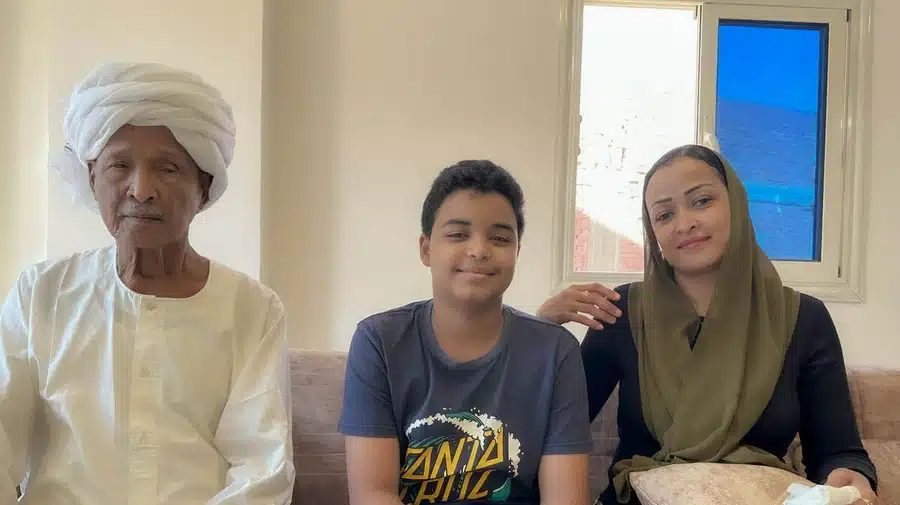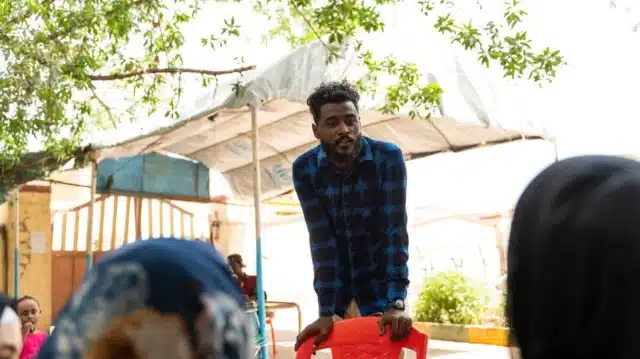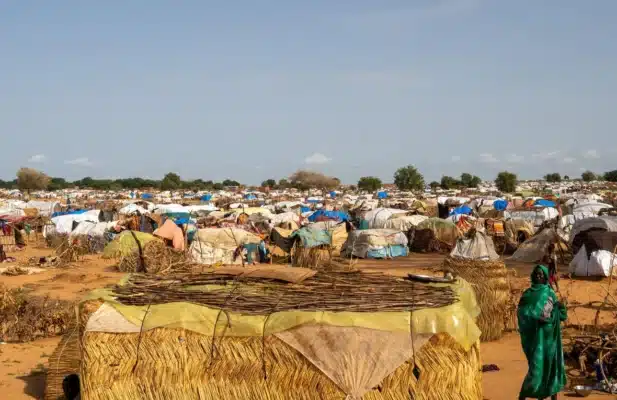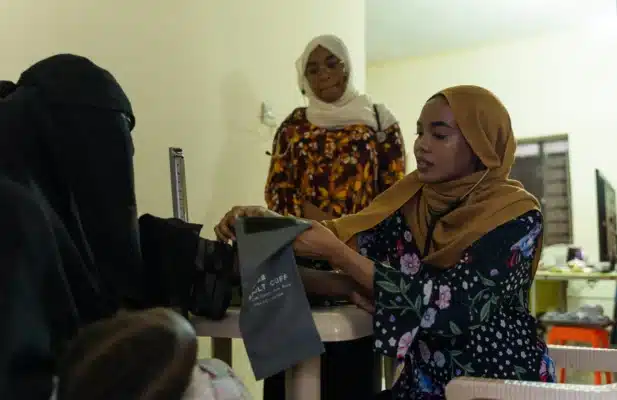
Sudanese refugee Siraj (centre) sits between his grandfather Abdallah and his mother Shireen in their apartment on the outskirts of Cairo. © UNHCR/Firas Al-Khateeb
With more than 317,000 refugees from the conflict in Sudan facing rising levels of hardship in Egypt, a shortage of funding is hampering efforts by UNHCR and its partners to provide help
By Firas Al-Khateeb and Nawar Eltahtawy in Cairo, Egypt
Near the small apartment on the outskirts of Cairo where Siraj, 12, now lives with his mother, Shireen, and grandfather, Abdallah, he regularly hears Sudanese children his own age heading noisily to and from the local Sudanese community school.
While over 30,000 Sudanese refugee children currently attend public and private schools in Egypt, for Siraj, education remains out of reach. Unable to afford the fees charged by the local community school and fearful of letting her son travel alone to faraway public schools, Shireen currently has no options to help her son continue learning.
“If Siraj has no ambitions or education, he has no life and no future,” explained a desperate Shireen.
Despite finding safety, adjusting to their new lives as refugees in Egypt is a daily struggle. Her 79-year-old father has diabetes and kidney disease, requiring medication and care that they can ill afford.
“My father is a very sick old man, every day is a tradeoff between buying him medicine and putting food on the table, as our resources ran out,” Shireen said.
It is a similar dilemma for many of the 317,000 refugees from Sudan who have fled to Egypt since the outbreak of armed conflict six months ago. Egypt has received the second-highest number of refugees from Sudan. Many – like Shireen and her family – have depleted their savings to pay for their journeys to safety. With Egypt also experiencing high inflation and rising costs of living, refugees are struggling to cover even their most basic needs.
Shortly after they arrived in Cairo, the family registered with UNHCR, the UN Refugee Agency, and received a one-time emergency cash payment to help cover rent and other expenses. But with the constant need to cover rent, food and health expenses, that money has long since run out and it is not clear how they will continue to support themselves.
UNHCR is working with the authorities and its local partners to help recent arrivals from Sudan, but with only 31 per cent of its overall funding needs for this year so far met, the gap between overall needs and the available assistance is growing wider.
“Over 317,000 refugees from Sudan have arrived in Egypt over the past six months and over 100,000 have approached our registration offices in Cairo and Alexandra,” said the UNHCR Representative in Egypt, Hanan Hamdan. “Most of them are women and children and female-headed households who require assistance. More funding is urgently required to enable us to continue our assistance programmes.”
Dreams on hold
The situation for Shireen and her family is a far cry from the comfortable life they knew in Khartoum. Shireen, a computer science graduate, had a job working in human resources for a marketing firm, while her father – a retired aviation engineer – received a steady pension. They supplemented their income by renting out property.
Now, Siraj’s dreams of graduating and becoming a pilot have stalled, and his grandfather worries what might happen if his own health fails.
“I am approaching the end, [but] my only fear is that after I pass my daughter and my grandson may suffer,” he said. “My wish is for them to have a bright future.”
While Shireen searches desperately for an answer to their immediate needs, there is only one long-term solution that she craves. “My message to the world is to help stop the war, help Sudan, and help Sudanese people go back home.”
Originally published by UNHCR on 30 October 2023.





